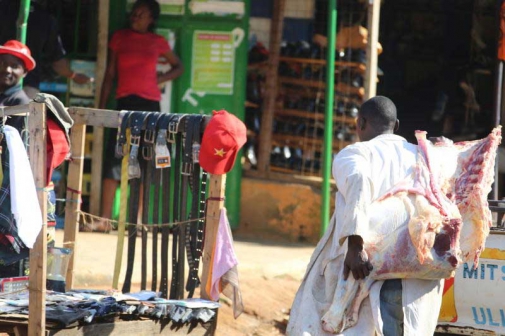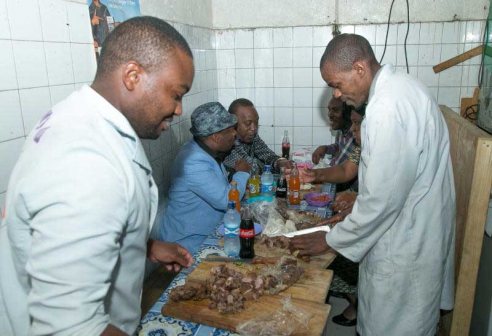
County Agriculture, Livestock Development and Fisheries Chief Officer Dr Muhari Muriithi is blaming unscrupulous traders for compromising food safety and putting the lives of millions of city residents at risk.
“We cannot rule out dishonesty. Some meat is sneaked into the city, especially in the late hours of the night, which is criminal. We have surveillance teams, but monitoring each and every point is an uphill task,” Dr Muriithi explained.
On February 7, a city businessman was arrested sneaking in rotten meat into City Market.
Joseph Murigi Muthama had ferried the decayed meat from Dagoretti in a classy car in the hope of smuggling it into the market by evading enforcement and veterinary officers’ dragnets. He was discovered when county askaris on routine check were drawn by a foul smell emanating from the car. By then, he had sold one of the five batches to an unidentified trader.
This incident brings to mind the day two cabinet secretaries and top medics were treated for cholera-related symptoms. The thought of expensively-dressed, high-profile men and women sprinting to the loos to let out a thunderous watery flow because of eating ‘dirty food’ sent Kenyans roaring with laughter.
But it was no laughing matter. By the time the waheshimiwa’s farts were echoing through the VIP washrooms, the capital city had reported about 400 cases of cholera-related symptoms, with 100 victims admitted to hospital. Three people died from the disease.

The sorry drama amplified the risk of food poisoning and cholera infection that the average Kenyan faces in the hands of food vendors. The Nairobi City County government estimates that there are about 600,000 food handlers responsible for what city dwellers eat, but only a fraction of them have the food handlers medical certificates. This situation, says, the county’s Health boss Dr Bernard Muia, is compounded by contaminated water and poor sanitation.
“At any given time, we have about 600,000 people who come in contact with the food that city residents take - from the five-star hotels to roadside food joints,” says Muia.
Thus, from five-star hotels to roadside vendors in the CBD and city estates, Nairobi’s 4 million people are sitting ducks. One wrong bite and you could be squatting in a loo with gritted teeth and closed eyes pooping your intestines out!
There are also incidences where Kenyans practically consume raw human waste without their knowledge. A research published a few years back revealed that our coins and small denomination banknotes are full of human excreta, sending shivers down the backs of mutura lovers who wolf down the delicacy at joints where operators handle money and still shika shika the nyama.
Muia says food poisoning is most likely to result from eating contaminated proteins, mainly beef, fish and poultry. He explains that the poisoning is a result of the way the food is prepared or stored.
Not that ‘fresh’ farm produce is any better. City markets display vegetables and fruits on muddy grounds contaminated with sewer and flood waters, while some produce is washed with water sourced from polluted rivers.
Although the county has announced a vaccination programme, which is yet to be rolled out, many of the food handlers are largely drawn from lower segments of society with immunity to certain levels of cholera infection. But not their customers who have ‘soft’ stomachs and live up the food chain.
“The infection dose of people in informal areas and other estates where sanitation and clean water is still a problem will not make them ill, but when they pass the same infection when handling food - and this is the danger as many waiters, even in five-star establishments, hire people from the informal settlements - their customers will automatically fall ill. The danger is that some of the food handlers are carriers,” says Muia.
Food safety is also compromised by unscrupulous traders who take advantage of surveillance gaps to sneak in uninspected meat into hotels and restaurants, especially late at night or the wee hours of the morning.
Some of the animals are slaughtered in the neighbouring counties of Kiambu, Kajiado and Machakos, then ferried discreetly on motorbikes, carts or vehicles that are unlikely to raise suspicion.
Similarly uninspected meat from animals slaughtered in places like Ruai and Njiru, as well as isolated areas along Nairobi River are transported to city establishments and butcheries in the cover of darkness.
Michael Chege who worked as a meat seller at Burma market says wild animals, including road kills and domestic animals are slaughtered in the bushes. Such meat finds its way into the market, at times with the knowledge of compromised health officers.
“For instance, when a customer asks for five kilogrammes of beef, it is mixed without their knowledge with a kilogramme or more of game meat, or one that has stayed for days after slaughter,” says Chege. Some food joint operators also slaughter chicken in their filthy backyards to minimise expenditure. Last year, the county public health officers carried an impromptu operation in eateries along Tom Mboya after it was alleged that chickens were being slaughtered in toilets.
A report by the outgoing County Assembly Environment Committee following a survey of markets and slaughterhouses is telling.
“In Kiamaiko, for instance, carcasses are washed on unhygienic floors, while others have dark colours, implying they were slaughtered elsewhere when they were already dead. The workers are medically unfit to handle meat. The means of transportation by motorcycles and other non-specified modes are hazardous,” the report stated.
Muriithi says the law is clear that vehicles ferrying meat and meat boxes should be licensed, painted in white and have a red strip with specific measurements, but the directive appears to be disregarded by some traders. This exposes the end consumers to the risk of food poisoning or infections like cholera.
“Meat contamination happens at two-levels: at slaughtering and delivery and processing. It can be an infection of pathogens or food poisoning. In restaurants, contamination takes place when food is being handled and prepared,” says Muriithi.
 The Standard Group Plc is a multi-media organization with investments in media
platforms spanning newspaper print
operations, television, radio broadcasting, digital and online services. The
Standard Group is recognized as a
leading multi-media house in Kenya with a key influence in matters of national and
international interest.
The Standard Group Plc is a multi-media organization with investments in media
platforms spanning newspaper print
operations, television, radio broadcasting, digital and online services. The
Standard Group is recognized as a
leading multi-media house in Kenya with a key influence in matters of national and
international interest.









